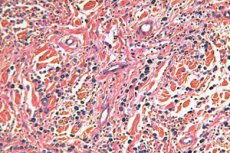New publications
Artificial intelligence could help detect the spread of breast cancer without a biopsy
Last reviewed: 02.07.2025

All iLive content is medically reviewed or fact checked to ensure as much factual accuracy as possible.
We have strict sourcing guidelines and only link to reputable media sites, academic research institutions and, whenever possible, medically peer reviewed studies. Note that the numbers in parentheses ([1], [2], etc.) are clickable links to these studies.
If you feel that any of our content is inaccurate, out-of-date, or otherwise questionable, please select it and press Ctrl + Enter.

A new study has found that artificial intelligence (AI) could help identify breast cancer that has spread to other parts of the body without the need for biopsies.
AI analyses MRI scans to detect the presence of cancer cells in the lymph nodes under the arms, researchers say.
In clinical practice, AI could help avoid 51% of unnecessary surgical lymph node biopsies to check for cancer, while correctly identifying 95% of patients whose breast cancer has spread, the study found.
Most deaths from breast cancer are due to its spread to other parts of the body, and the cancer usually first spreads to a lymph node in the armpit, explained lead researcher Dr. Basak Dogan, director of breast imaging research at the University of Texas Southwestern Medical Center.
Detecting cancer that has spread to a lymph node "is critical to making treatment decisions, but traditional imaging techniques are not sensitive enough to detect it effectively," Dogan said in a medical center news release.
Patients with benign MRI or needle biopsy results are often forced to undergo surgical lymph node biopsy because these tests can miss a significant number of cancer cells that have spread beyond the breast, Dogan added.
The researchers trained the AI using MRI scans of 350 newly diagnosed breast cancer patients who had cancer found in the lymph nodes.
Testing showed that the new AI was significantly better at identifying such patients than doctors using MRI or ultrasound, the researchers reported in the journal Radiology: Imaging Cancer.
"This is an important breakthrough because surgical biopsies have side effects and risks despite the low probability of a positive result confirming the presence of cancer cells," Dogan explained. "Improving our ability to exclude the presence of cancer cells in lymph nodes during routine MRI using this model may reduce this risk, improving clinical outcomes."
